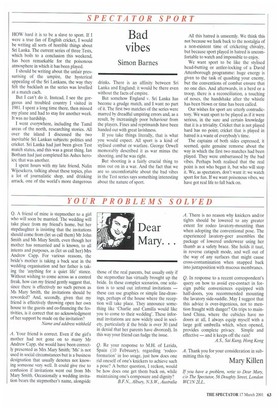Bad vibes
Simon Barnes
HOW hard it is to be a slave to sport. If I were a true fan of English cricket, I would be writing all sorts of horrible things about Sri Lanka. The current series of three Tests, which boils to a conclusion this weekend, has been remarkable for the poisonous atmosphere in which it has been played.
I should be writing about the unfair pressurising of the umpire, the hysterical appealing of the Sri Lankans, the way they felt the backlash as the series was levelled at a match each.
But I can't do it. Instead, I see the gorgeous and troubled country I visited in 1981. I spent a long time there, then missed my plane and had to stay for another week. It was no hardship.
I went everywhere, including the Tamil areas of the north, researching stories. All over the island I discussed the two inevitable Sri Lankan subjects: politics and cricket. Sri Lanka had just been given Test match status, and this was a great thing. Ian Botham had just completed his Ashes heroics; that was another.
I spent hours with my late friend, Min Wijesekera, talking about these topics, plus a lot of journalistic shop, and drinking arrack, one of the world's more dangerous drinks. There is an affinity between Sri Lanka and England: it would be there even without the facts of empire.
But somehow England v. Sri Lanka has become a grudge match, and I want no part of it. The first two matches of the series were marred by dreadful umpiring errors and, as a result, by increasingly poor behaviour from the players. Fines and reprimands have been handed out with great lavishness.
If you take things literally, that is what you would expect. All sport is a kind of stylised combat or warfare. George Orwell memorably described it as war minus the shooting, and he was right.
But shooting is a fairly crucial thing to miss out on in a war. And the fact that we are so uncomfortable about the bad vibes in the Test series says something interesting about the nature of sport. All this hatred is unseemly. We think this not because we hark back to the nostalgia of a non-existent time of cricketing chivalry, but because sport played in hatred is uncomfortable to watch and impossible to enjoy.
We want sport to be like the stylised head-butting or antler-locking of a David Attenborough programme: huge energy is given to the task of quashing your enemy, but the conventions of combat ensure that no one dies. And afterwards, in a herd or a troop, there is a reconciliation, a touching of noses, the handshake after the whistle has been blown or time has been called.
Our wishes for sport are utterly contradictory. We want sport to be played as if it were serious, in the sure and certain knowledge that it is a triviality. Cricket that is not played hard has no point; cricket that is played in hatred is a waste of everybody's time.
The captains of both sides expressed, it seemed, quite genuine remorse about the way in which the first two matches had been played. They were embarrassed by the bad vibes. Perhaps both realised that the real point is not who began it, but who will stop it. We, as spectators, don't want it: we watch sport for fun. If we want poisonous vibes, we have got real life to fall back on.


































































 Previous page
Previous page